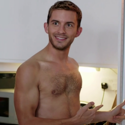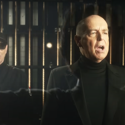[October is LGBT History Month and to celebrate, Queerty’s gaying up each day with our 31 Days of Queerstory.]
From his earliest short films to his critically-acclaimed documentaries The Cockettes and We Were Here, David Weissman is a pioneering gay filmmaker who has been chronicling the LGBT experience for over thirty years.
This month, Weissman’s body of work will be presented in New York City over the course of three nights. Each screening will be followed by a Q&A and conversation with the veteran filmmaker.
Queerty chatted with Weissman about his exciting month ahead, his films and his thoughts on the HIV/AIDS epidemic today. He’s currently in New York City, gearing up to attend the News and Documentary Emmys, where We Were Here had been nominated for Outstanding Historical Programming Long Form, but unfortunately didn’t win.
How about we take this to the next level?
Our newsletter is like a refreshing cocktail (or mocktail) of LGBTQ+ entertainment and pop culture, served up with a side of eye-candy.
So you’re on your way to the Emmys.
Yes. We Were Here was nominated in the News and Documentary Emmys in the category of Outstanding Historical Programming.
How does it feel to be nominated?
It’s great. It’s wonderful to be able to call myself an “Emmy-nominated Director”, whether I win or not. It’s a nice thing to be able to append to my name. [Laughs] You know, every acknowledgement that an artist’s work receives is welcome and sweet.
Of course, this is just one of many acknowledgements.
[We Were Here] has been welcomed beautifully. It was short-listed for the Academy Awards. It’s been seen all over the world. It’s very gratifying.
You’ve been making films for over 30 years now. How has the film industry changed in its response to LGBT films since you started your career in the 1980s?
Gosh, that’s an interesting question. I mean, my relationship to the entertainment industry is so tangential. For many years I was making these kind of crazy little short films that really had no connection to the mainstream film world at all. And then making documentaries was something that I never anticipated. I don’t know that my personal experience is a good one for interpreting that, but certainly the presence of LGBT characters and story lines in mass media is night and day since the ’80s.
We Were Here examines when the HIV/AIDS epidemic first hit the gay community, and the ripple effect it’s had over the years. I’m curious what you make of the rising number of HIV infections among young gay men recently?
It’s very distressing. And it’s not just among young men. It’s also men of my generation, many of whom have managed to stay uninfected through 35 years of being sexual during the epidemic. I think that there’re very many aspects to it, and I think that it’s different generationally.
I think that many men of the older generation are just tired of living with AIDS, either as negative or positive people, for so long. And I think the sense of urgency that was so impactful in changing our sexual behaviors in the ’80s and ’90s is not the same that it was. And I find it incredibly distressing. It’s a subject that comes up in every interview that I’ve done with the film over the past few years.
 Do you think We Were Here could have a positive impact on changing people’s sexual behavior?
Do you think We Were Here could have a positive impact on changing people’s sexual behavior?
Many people have said to me that if young people see the film it will remind them how terrible of a disease AIDS is, but I don’t think that that’s really where the prevention power of We Were Here will come. Because it is a different disease. If one has access to medical care, it’s not fatal anymore.
I think the prevention power of We Were Here is the beautiful message of community that comes through, of how a community really stood up and took care of its own health and took care of its brothers. Many young men have spoken to me about how powerful that message has been for them, and that sense that we are all in this together, we all have a responsibility to contribute to the end of the epidemic, and that there is such a tremendous beauty in living as a member of a community that really loves and takes care of itself.
As someone who has lived through San Francisco’s LGBT history — not just the AIDS epidemic, but everything else as well — how do you think the gay culture has changed over the course of your lifetime?
That’s a huge question. And I think it’s almost impossible to answer simply.
I think in parallel there’s been such undeniable progress on so many levels in terms of our legal rights and in terms of the way we are perceived in society, and yet at the same time I think there is a loss of that community feeling that was so profound during the epidemic when we really had to come together.
When I was younger, I would sometimes hear from the men of the pre-Stonewall generation and they would sometimes say that they missed some of the pre-Stonewall period because there was kind of a secret society aspect to it. Certainly they were all very cognizant of the terrible oppression that they were living under, but there was also an intensity to that experience of secret society life. And I think for my generation there’s a little bit of a sadness at the loss of the incredible community that came together first in the ’70s as we were emerging as a political and social and cultural entity, but also in the ’80s when we really had to come together to save our lives.
I hope that the movie helps inspire in queer people, but in people in general, a beauty and power of living one’s life with a sense of community and engagement.
This month you have a number of screenings of your work happening in New York. It’s kind of a celebration of you.
[Laughs] It’s turned into a celebration of me. Sort of by accident. And it’s wonderful. I wanted to spend some time in New York and explore what my future in filmmaking might have to offer. I was searching for places to have screenings of my films while I was here and it just kind of came together magically. Now there’re four organizations that are co-presenting pretty much all of my work during this month that I’m here. For me it’s absolutely a wonderful thing to have that kind of identity that’s not specific to one film, but is more broadly defined by my body of work. It’s really a wonderful opportunity.
 In regards to your entire body of work, what do you hope people get from your films?
In regards to your entire body of work, what do you hope people get from your films?
Both The Cockettes and We Were Here are love letters to San Francisco. Really all of my films are, in some way, inspired by my relationship to the city of San Francisco. I hope both of those films will continue for many, many years to speak to the best qualities of what San Francisco has meant to the world, to queer people, to alternative people. The sense of magic that appeals to me and drew me to San Francisco, I hope that my movies have captured some of that magic even after San Francisco has become a different place.
We Were Here screens tonight at the Leslie Lohman Museum of Gay and Lesbian Art in New York City. Weissman’s short films will be screened on October 15 at the Segal Theatre, The Graduate Center, CUNY. The Cockettes will be screened on October 24, location TBA. Each screening will be followed by a talkback with Weissman. For more information, visit visualaids.org.




















jonjct
Stonewall is now full of tourists and groups of straight girls from New Jersey doing a “girls night out”. The village is so different now.
viveutvivas
True. NYC and SF have become the abodes of the rich and the tourists. After some decades of policies favoring real estate and other corporations to the detriment of everyone else, these cities don’t have vital working and middle class gay communities any longer. Something vital has been lost, which is sad.